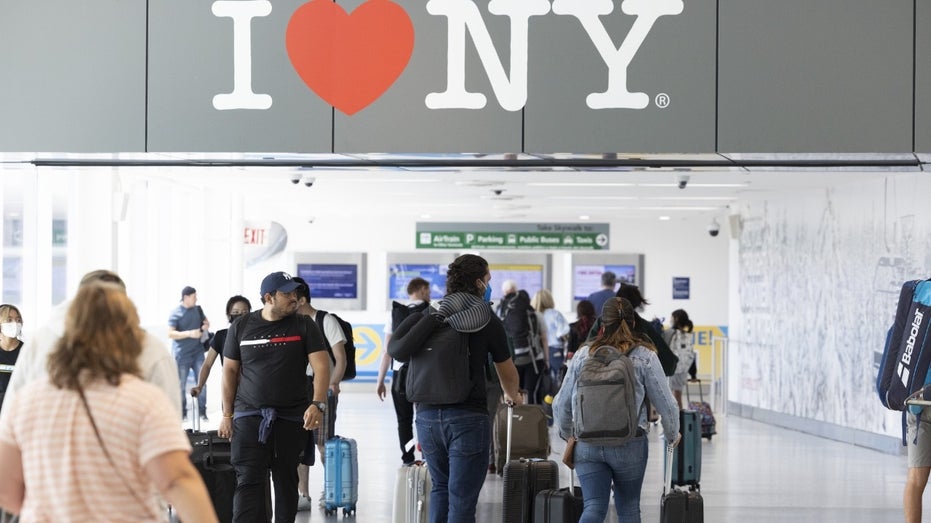Chinese company aims to sell 3 US resorts for $1.3 billion
Dajia Insurance is trying to capitalize on a surge in travel after taking over the properties from China’s Anbang Insurance
China's 'strongest foot soldiers' in the US are Fortune 500 companies: David
Wolfpack Research founder and CIO Dan David discusses the Chinese government continuing its espionage campaign against the U.S., as well as its economic growth.
A Chinese company is looking to sell three major U.S. resort hotels at a combined price tag of $1.3 billion, seeking to cash out these holdings during a powerful surge in leisure travel and resort business.
Dajia Insurance Group Co. is putting up for sale the Montage in Laguna Beach, California, the Four Seasons resort in Jackson Hole, Wyoming, and the Four Seasons in Scottsdale, Arizona, according to people familiar with the matter. BofA Securities Inc. and real estate banking and brokerage firm Eastdil Secured LLC are marketing the hotels on behalf of the seller, these people said.
The three properties are part of Dajia’s Strategic Hotels & Resorts portfolio, a group of 15 luxury U.S. resorts and hotels that also includes urban properties such as the JW Essex House hotel overlooking Manhattan’s Central Park and the InterContinental Hotels in Chicago and Miami.

A tourist stands on a rock along the shore of Jackson Lake in Jackson Hole, Wyoming, on Thursday, Aug. 22, 2019. (David Paul Morris/Bloomberg via Getty Images / Getty Images)
WORLD BANK CUTS CHINA GROWTH FORECAST AS COVID-19, REAL-ESTATE CRUNCH TAKE TOLL
The Chinese company, which took control over most of the operations of China’s Anbang Insurance Group Co., had agreed in 2019 to sell the entire Strategic portfolio to South Korea’s Mirae Asset Financial Group for $5.8 billion. However, that deal unraveled when the pandemic caused travel to dry up and hotel revenue to plunge.
Now, Dajia is back in the market with the three hotels, which represent some premier resorts in their cities at a time when leisure travel has been booming.
Americans’ pent-up demand for travel erupted last year and has continued this year. Many travelers are showing a preference for beaches, mountains and other resort destinations over trips to big cities. Urban hotels have also suffered from the sharp drop in business travel, which remains below prepandemic levels.

Travelers at John F. Kennedy International Airport in the Queens borough of New York, on Friday, July 1, 2022. (Angus Mordant/Bloomberg via Getty Images / Getty Images)
By contrast, the resort business may never have been more lucrative. Average daily room rates and revenue per available rooms, a popular industry metric, both reached new highs for U.S. resorts earlier this year and remain near those levels, according to lodging data firm STR.
Some travel analysts expect the mania for resorts to cool somewhat next year, especially if the country falls into a recession and as that pent-up travel demand from the COVID-19 lockdown period eases.
Yet even with any near-term downturn, a burgeoning interest in resorts and leisure trips looks here to stay, said Eric Resnick, chief executive officer of KSL Capital Partners, a Denver-based investment firm that owns or operates more than 400 resorts, hotels, ski areas and other leisure businesses worldwide.

Downtown Scottsdale and suburbs of Phoenix, Arizona, with the White Tank Mountain Range in the background. Dajia Insurance hopes to sell the Four Seasons in Scottsdale, Arizona, for $300 million. (iStock / iStock)
"The mass affluent consumer has been fortunate to have higher savings and job security," he said. "That demographic drives travel and leisure broadly. We don’t see that going away."
Dajia’s plan to sell the three hotels marks the latest effort by a Chinese company to exit or sell commercial real estate holdings in the U.S. While Chinese companies were aggressive buyers of hotels, office towers and other trophy properties in U.S. cities, their investment started falling four years ago, around the time that Chinese regulators made it harder for many companies to move money out of the country.
APPLE MOVES MANUFACTURING OF IPHONE 14 FROM CHINA TO INDIA
Dajia is looking to raise $300 million each from sales of the two Four Seasons properties, and $700 million from the Montage Laguna Beach, according to people familiar with the sales process. The Southern California resort features more than 250 guest rooms and a 20,000 square-foot spa on a 30-acre beachfront property, according to its website.
Dajia also owns the Waldorf Astoria hotel on Manhattan’s Park Avenue, taking over the property after Anbang paid $1.95 billion for it in 2015, the biggest price tag ever for a stand-alone U.S. hotel.
GET FOX BUSINESS ON THE GO BY CLICKING HERE
The company is now struggling to complete its plan for combining hundreds of guest rooms into luxury residences, a process that is shaping up as one of the largest, most intricate and priciest condo conversion and hotel rebuild projects undertaken. The process has fallen behind schedule and gone well over budget, say people familiar with the matter.




















